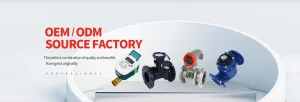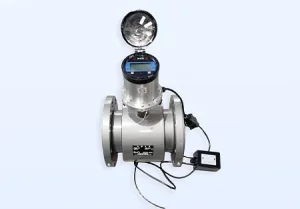
Shandong Chenshuo Instruments Co., Ltd., based in Linyi City, China’s “Hometown of Water Meters,” excels in creating reliable smart metering solutions like the Electromagnetic Water Meter LXE-100. Since 2014, the company has produced over one million units yearly, earning accolades like the 2023 “Shandong High-Quality Brand.” The LXE-100 uses Faraday’s law for precise flow measurement, offering features like a 400:1 range ratio and six-year battery life. Through rigorous testing, including flow, pressure, and environmental checks, Chenshuo ensures accuracy and compliance with standards like ISO 4064, supporting efficient water management and smart systems.
Water is becoming scarce due to growing cities, changing weather, and industrial needs. Precise water metering ensures fair billing and helps save resources. It also spots leaks early, which is vital for sustainable water use. At Shandong Chenshuo Instruments Co., Ltd., a high-tech company started in 2014 and based in Linyi City—known as China’s “Hometown of Water Meters”—we focus on creating reliable smart meters. With over one million units made yearly and a strong research team holding four invention patents and ten utility model patents, our products, like the Electromagnetic Water Meter LXE-100, deliver top-notch accuracy through careful testing.
New testing methods use technology like the Internet of Things (IoT) and real-time data to improve meter performance. These go beyond old-school approaches, ensuring meters stay accurate and last longer in smart water systems. Shandong Chenshuo’s products, including ultrasonic, mechanical, and electromagnetic meters, are tested in our modern workshops. They meet strict standards like ISO9001, ISO14001, and EU CE certifications. Our 2024 NB-IoT smart water platform project shows how we use tech to ensure precise, remote monitoring.
Water meters are key to tracking water use and spotting issues in water systems. Knowing their types and common problems helps show why advanced testing is so important.
Mechanical meters, like our rotary-wing series, use spinning parts for affordable home use. However, they can wear out over time. Ultrasonic meters, such as our IoT models, measure flow with sound waves, offering great accuracy in tough conditions. Electromagnetic meters, like the Electromagnetic Water Meter LXE-100, work using Faraday’s law: when conductive liquids flow through a magnetic field, they create a voltage tied to their speed. Sensors capture this voltage, and a converter processes it. The LXE-100, designed for DN40-DN50 pipes, includes RS485 communication, a 400:1 range ratio (R=400), and Class 2 accuracy, making it perfect for industrial and city water systems.
Meters can become inaccurate due to worn parts, magnetic interference, or changes in temperature. For electromagnetic meters like the LXE-100, low conductivity (below 5 μS/cm) can mess up readings. Air bubbles or dirt in pipes also cause errors. At Shandong Chenshuo, with over 100 staff in research and production, we’ve seen how untested meters increase leakage rates, sometimes up to 40% in small towns. Our thorough testing mimics real-world conditions to keep meters reliable.
At Shandong Chenshuo, we use cutting-edge equipment to test over a million meters each year, ensuring they exceed what customers expect.
Electromagnetic Water Meter LXE-100,

We start by inspecting the meter’s look and feel. Threads must fit perfectly to avoid leaks. We check for scratches or defects and test sensitivity to detect tiny flows, like 0.003 m/s in the LXE-100. This ensures our meters meet our strict tracking system and won’t fail early.
We test flow rates at four points: minimum (Q1), transitional (Q2), common (Q3), and overload (Q4). For the LXE-100, powered by a 3.6V lithium battery that lasts over six years, we confirm ±2% accuracy in high-flow zones. We use automated systems to mimic different flow speeds, meeting standards set by the Shandong Institute of Metrology. This ensures precise measurements for tasks like dividing water usage zones.
We test meters under high pressure, up to 1.6 MPa for the LXE-100, to check for leaks or weak spots. We also run repeated stress tests to make sure the meter stays strong, which is crucial for industrial use where pressure is high.
We simulate tough environments, like temperatures from 0.1°C to 50°C (T50 grade) and conductivity above 5 μS/cm. We test against magnetic interference to protect readings. For the LXE-100, RS485 communication ensures data stays accurate. We also check how meters handle different liquid thicknesses, keeping measurements consistent.
Calibration isn’t just a one-time task—it’s ongoing to keep meters working well.
First, clean pipes to remove dirt. Then, use certified equipment to test Q1-Q4 flows. For the LXE-100, connect via RS485 to check data in real time and adjust for accuracy. Our after-sales certification helps users follow these steps correctly.
Shandong Chenshuo follows ISO 4064 for accuracy and AWWA M6 for testing methods, earning Pattern Approval Certificates. This supports our 2024 Alibaba International Station launch, expecting ¥10 million in exports by 2025.
Plan yearly inspections, using the LXE-100’s LCD screen for easy checks. If repairs are needed, we swap out parts quickly, backed by our warranty that covers fixes during setup. We also plan replacements to keep systems running smoothly in smart water platforms.
Testing meters isn’t easy, but Shandong Chenshuo tackles these issues with clever fixes.
Leaks from poor testing cause up to 20% water loss in China. Our LXE-100 supports DMA zoning to cut these losses. We design meters to resist freezing and use software to fix digital errors, keeping readings steady.
Our NB-IoT platforms use AI to predict issues, monitor remotely via RS485, and spot problems early, making measurements more accurate.
The future of metering is all about smart tech and connections.
5G and IoT will make data sharing faster, extending the LXE-100’s six-year lifespan with predictive upkeep. Our 2024 project puts us ahead in this space.
Smart systems will lower China’s 27% water loss rate with AI-driven metering, supporting national goals for digital upgrades.
Accurate testing is the key to trustworthy water systems. At Shandong Chenshuo, with 2024 sales topping ¥50 million and a focus on new ideas, our testing methods ensure products like the Electromagnetic Water Meter LXE-100 offer great accuracy. By following these practices, water companies can save resources and work better. Reach out to us for custom solutions—your smart choice for metering!
(Word count: 1,305)
Q:What makes the LXE-100 Electromagnetic Water Meter suitable for precision testing?
A:The LXE-100 features a 400:1 range ratio, Class 2 accuracy, and excellent linearity, allowing precise measurements from 0.003 m/s without multi-point corrections, ideal for advanced testing in varied flow conditions.
Q:How does Shandong Chenshuo ensure compliance with international standards in water meter testing?
A:We adhere to GB/T 778-2007, ISO 4064, and AWWA M6 through rigorous calibration in our certified facilities, backed by ISO9001 quality management and Pattern Approval Certificates from the Shandong Institute of Metrology.
Q:What after-sales support does Chenshuo provide for water meter maintenance?
A:Our services include lifetime technical guidance, unconditional repairs or replacements during warranty, and remote diagnostics via RS485 or NB-IoT platforms to maintain precision and minimize downtime.